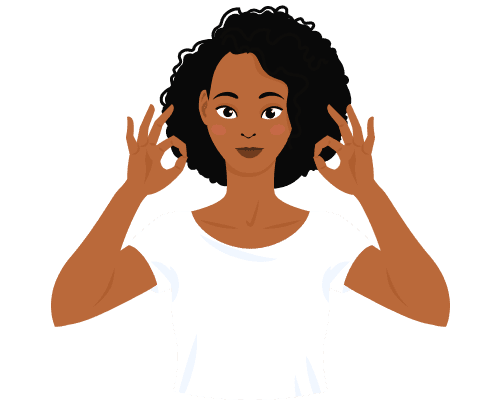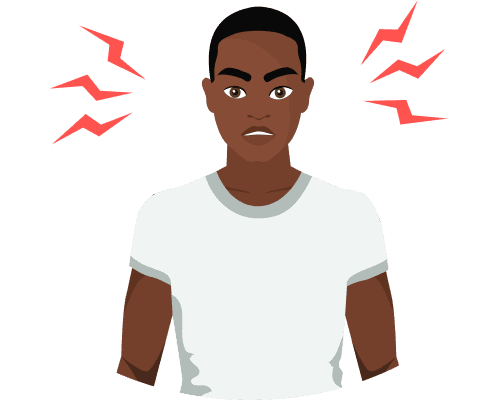
Wondering if you have an anxiety disorder?
Anxiety is a normal human feeling that everyone encounters at some point in their lives, such as when confronted with a difficulty at work, before taking an exam, or making a major choice.
Anxiety disorders, on the other hand, are different. They generate so much discomfort that it interferes with a person's capacity to live a regular life. Worry and fear are persistent and overpowering for persons suffering from anxiety disorders, and they may be devastating.
Instructions: Simply answer the questions on how you have behaved and felt during the past 6 months. Take your time and answer truthfully for the most accurate results.
This online screening is not a diagnostic tool. Only a trained medical professional, like a doctor or mental health professional, can help you determine the best treatment for you.
What is Anxiety?
Anxiety is an emotion of nervousness in an extraordinary situation. And it's a perfectly natural reaction that motivates you to put in more effort and complete a difficult task.
Anxiety is initially a protective mechanism, alerting you to danger and mobilizing you to act and protect yourself and your loved ones. Its purpose is to mobilize all of your body's systems and get them ready to fight, flee, or hide to survive. So, it's fine to feel differently in an emergency or a life-threatening circumstance.
With the passage of time and civilization's evolution into a safe, inclusive space with far fewer chances of dying from disease, the forces of nature, or a duel with a stronger predator, the animal fear of death has evolved into an anxiety disorder that serves only to diminish the pleasure and joy of peaceful life.
According to the >World Health Organization (WHO), anxiety disorder is a mental illness yielding intense, constant, and groundless fear.
What causes anxiety?
As your anxiety still aims to protect you, anything you find unpleasant or too pleasant to handle at once is considered as dangerous.
As a result, anxiety can be caused by a variety of factors, including stressful work-life schedules, social settings that may be reenacting painful past experiences (bullying, denial, and problematic relationships), as well as genetically transmitted brain chemistry, and poor nutrition.
Some anxiety causes are beyond your control, such as genetics or basic behavioral patterns learned in childhood, but all you have to do is accept your unique trait and learn to manage it.
The others, such as perfectionism, work-life balance, and nutrition, are more manageable and changeable.
What does anxiety feel like?
Anxiety disorders are never simple to deal with.
In a lighter form, anxiety feels like endless stress, irritability, inability to relax and enjoy the present moment, and procrastination. On a physical level, you may feel a persistent sense of tension in your body, as well as fatigue, sleep, and concentration issues.
In a heavier form, anxiety disorder strikes with constant feelings of anger, fear, devastation, muscle tension, mental exhaustion, depression, and developing phobias. Back, neck, and stomach pain, nausea, diarrhea, sleeplessness, and strong hunger swings are all signs of severe anxiety.
What are anxiety symptoms?
Common anxiety attack symptoms include fast heartbeat, tremors, shortness of breath, sweating, muscle soreness, nausea, overwhelming sensations of danger, stunning dread, and even fainting.
They may differ since each person reacts differently to a sudden adrenaline excess.
In fact, the bodily feelings you experience during an anxiety attack are the same as those you experience in a life-threatening circumstance. An anxiety episode occurs when the human “caution system” malfunctions, causing you to be concerned about improbable or unrealistic threats.
How to know if you have anxiety?
Anxiety disorder is becoming more widespread due to stressful work environments, challenging relationships, and societal pressure.
And it's a lot more than a lousy mood. Anxiety is robbing you of your productivity, self-esteem, social skills, mood, and physical well-being piece by piece.
Some anxiety might be relieved by incorporating mindfulness activities into your daily routine. Some people require expert psychological assistance in addition to prescribed drugs.
Eat whatever you want with intermittent fasting!
Take an anxiety test regularly
Anxiety management is a dynamic process. You may be able to bear all of the hardships for a few days or even months. And sometimes, you cannot help but become exhausted by obsessing over the tiniest minutiae.
Take an anxiety test to see where you stand and what you can do to feel better and control your anxiety.
Your mental health has a significant impact on the quality of your life. Examine your psychological soundness on a regular basis to live a healthy and happy life.
How to get rid of anxiety?
Cognitive-behavioral psychology is the most effective treatment for anxiety disorders. CBT therapy trains you to keep note of your reactions to various triggers in order to spot the patterns that lead to anxiety attacks.
The goal is to acquire strategies to calm down in an emergency and to disassociate the unfounded and overpowering emotion of terror from your daily life.
While other methods of psychology uncover and examine individual anxiety reasons and characteristics, CBT focuses on reframing - breaking damaging imprints and replacing them with healthy ones.
Complement the synergy between you and your psychologist by practicing meditation, mindfulness, and grounding practices on your own for a better outcome.
Bottom line
Anxiety is a natural human defense mechanism that helps you live and thrive. On the other hand, anxiety disorder is not; it paralyzes you with fear of unfounded risks. Pathological anxiety can be caused by a variety of factors, with one option being to seek help once you've been restless for a time. Anxiety symptoms include a persistent sense of danger, tremors, shortness of breath, cardiopalmus, and difficulties with concentration and sleep. Examine your mental health and, if necessary, seek psychological assistance.






